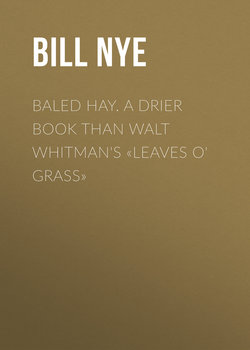Читать книгу Baled Hay. A Drier Book than Walt Whitman's «Leaves o' Grass» - Nye Bill - Страница 4
ABOUT SAW MILLS
ОглавлениеRiver Falls, Wis., May 80
I HAVE just returned from a trip up the North Wisconsin railway, where I went to catch a string of codfish, and anything else that might be contagious. The trip was a pleasant one and productive of great good in many ways. I am hardening myself to railway traveling, like Timberline Jones' man, so that I can stand the return journey to Laramie in July.
Northern Wisconsin is the place where the "foreign lumber" comes from which we use in Laramie in the erection of our palatial residences. I visited the mill last week that furnished the lumber used in the Oasis hotel at Greeley. They yank a big wet log into that mill and turn it into cash as quick as a railroad man can draw his salary out of the pay car. The log is held on a carriage by means of iron dogs while it is being worked into lumber. These iron dogs are not like those we see on the front steps of a brown stone house occasionally. They are another breed of dogs.
The managing editor of the mill lays out the log in his mind, and works it into dimension stuff, shingle holts, slabs, edgings, two by fours, two by eights, two by sixes, etc., so as to use the goods to the best advantage, just as a woman takes a dress pattern and cuts it so she won't have to piece the front breadths, and will still have enough left to make a polonaise for the last-summer gown.
I stood there for a long time watching the various saws and listening to their monotonous growl, and wishing that I had been born a successful timber thief instead of a poor boy without a rag to my back.
At one of these mills, not long ago, a man backed up to get away from the carriage, and thoughtlessly backed against a large saw that was revolving at the rate of about 200 times a minute. The saw took a large chew of tobacco from the plug he had in his pistol pocket, and then began on him.
But there's no use going into details. Such things are not cheerful. They gathered him up out of the sawdust and put him in a nail keg and carried him away, but he did not speak again. Life was quite extinct. Whether it was the nervous shock that killed him, or the concussion of the cold saw against his liver that killed him, no one ever knew.
The mill shut down a couple of hours so that the head sawyer could file his saw, and then work was resumed once more.
We should learn from this never to lean on the buzz saw when it moveth itself aright.
